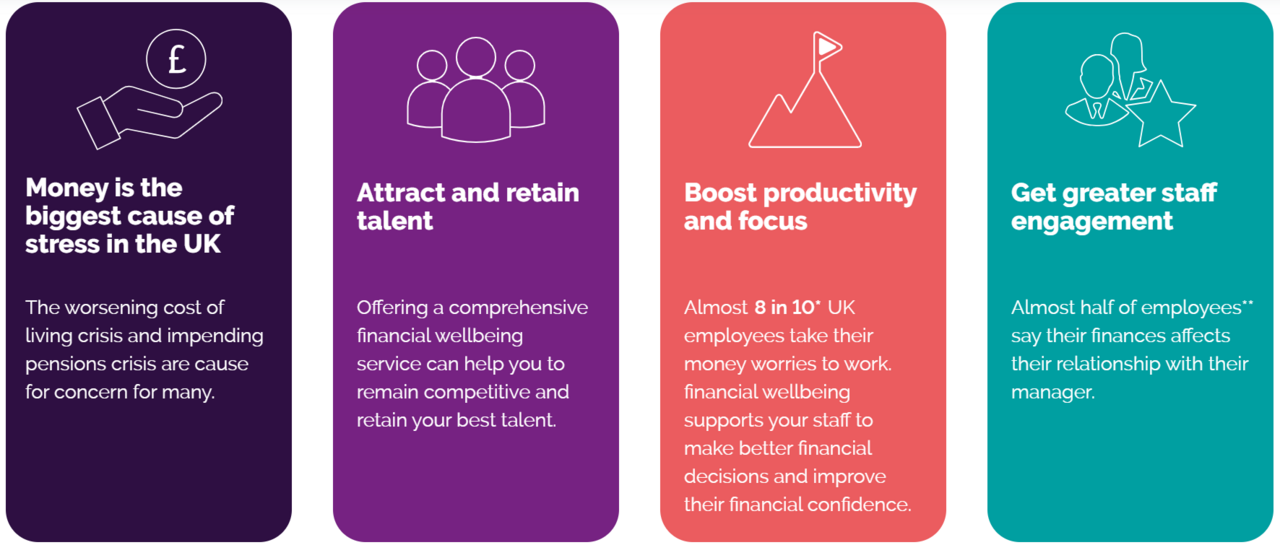
Moneyhealth, our financial wellbeing offering for your employees
We believe every employee deserves to feel confident about their financial future. Supercharge your workforce through the power of good advice.
Why should you care about your employees' financial wellbeing?
According to a financial wellbeing survey*, money is the biggest source of stress in the UK. Over 25% of adults feel stressed about money every day and one in five employees describe their financial wellbeing as ‘poor’ or ‘very poor’. Further, an employee survey** found financially stressed employees are twice as likely to leave. It doesn’t have to be this way for your business.
Employee benefits – financial wellbeing programme
A financial education and wellbeing programme can take the stress out of their money situation and improve engagement with your employees and your business.

What you get with Moneyhealth
A state of the art digital platform and app
24/7 access to online support, with goal tracking, budgeting tools, engaging content, financial health checks and personalised resources. Employees can also access the Bestinvest platform for investing. Bestinvest is part of Evelyn Partners.

A dedicated financial coach and 1-2-1 sessions for every employee
Our platform gives everyone in your organisation, from graduate to senior executives, access to their own professionally-qualified expert to meet online four times a year. They can message them at any time for further guidance.

Executive consulting
Dedicated time with an expert financial planner and tax adviser, for those in your business with the least time and the most complex financial affairs.

Educational seminars
Delivered in person or online. We have a range of popular topics to choose from and can develop bespoke content for your team.

Evelyn Partners Moneyhealth for your employee financial wellbeing programme
Our platform combines cutting-edge technology with coaching and planning. With dedicated financial coaches, financial planners and investment specialists, we help people make key financial decisions.
- Everyone will benefit. From your newest graduate recruit through to the senior managers and beyond, everyone in your team will have access to their own coach. Coaches can educate and empower your people, so they can make the best decisions for themselves and their financial future. Your senior executives will meet with a dedicated financial planner and investment manager, to get fast and efficient expertise for their complex needs. Your executives can choose to engage these professionals for formal, on-going advice at their own cost
- Current insight. Our platform allows easy access for all employees to financial education, engaging content and handy tools, empowering all of your people to take control of their finances
- Bespoke seminars. Our experts run interactive, bespoke seminars to your employees on a range of subjects including how to create a financial plan, saving for a house deposit, planning for retirement and explaining their existing employee benefits
The benefits for employees
Through all life’s important moments, we can help your employees plan, manage and future-proof their finances. By having a plan in place for their future, your employees can concentrate on the present and be fully engaged with their role in your business. As a result, they’re less likely to leave.
With our financial wellbeing programme, your employees can start:
Making the most of their disposable income
They can build the foundations of good financial planning by using ISAs, pensions and other tax-efficient investments
As with all investments, capital is at risk
Making their money work hard for them
Securing their financial future: the workplace pension, considerations for first time buyers and preparing for the unexpected
Planning for their priorities
Identify gaps in their personal plan and how they can fund this without impacting longer term plans
Preparing for the retirement that they want and deserve
Helping to prepare for the retirement they want and deserve
Ensuring their decisions make the most of all tax allowances available
Protecting them and their loved ones
Later life planning
Making sure their pension lasts throughout their lifetime
Covering the cost of long-term care
Passing on their wealth
Talk to us
For more information, speak to one of our experts.

* Source: Perkbox 2019 UK financial wellbeing survey
** Source: PWC 2022 Employee financial wellness survey
